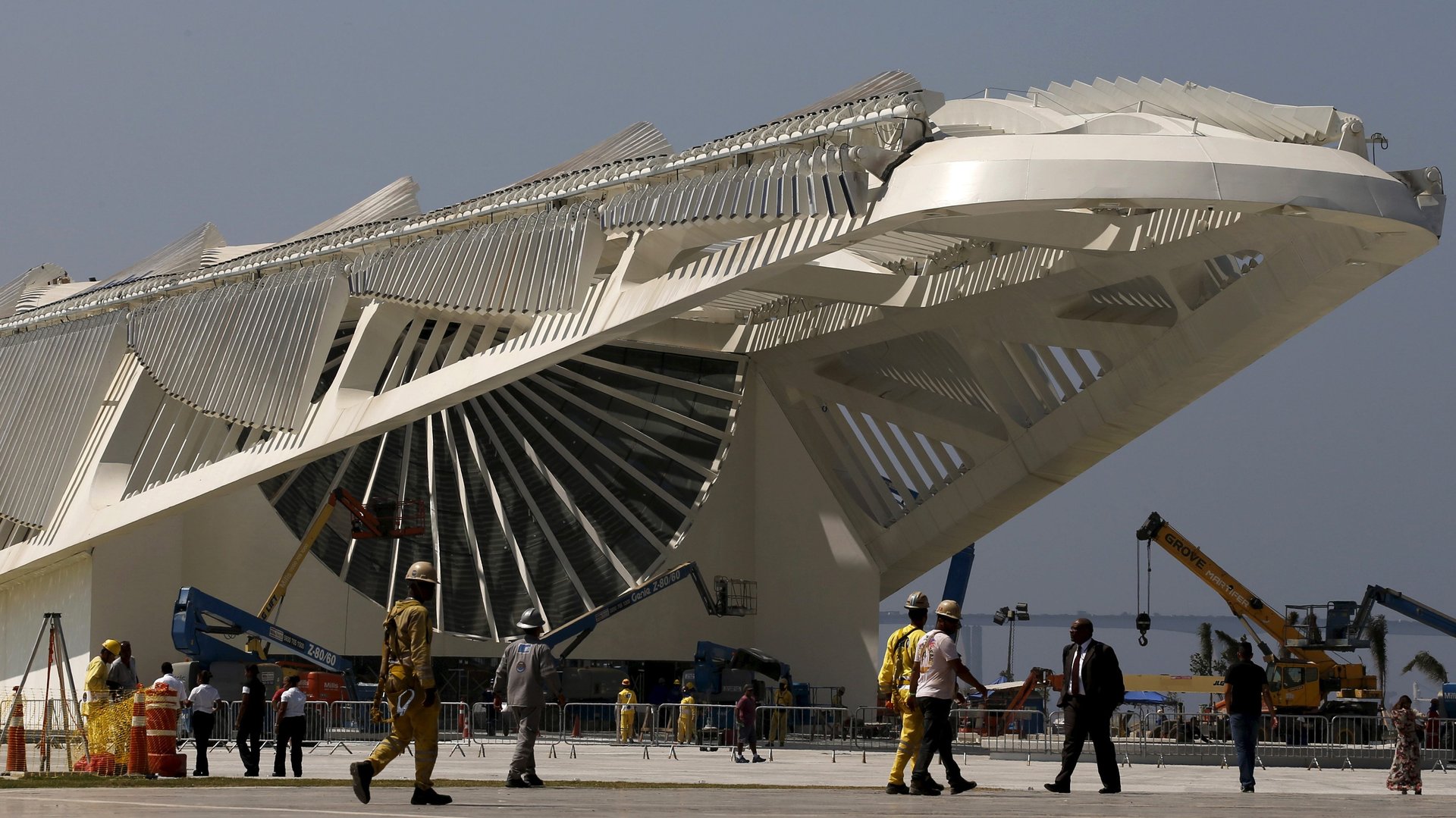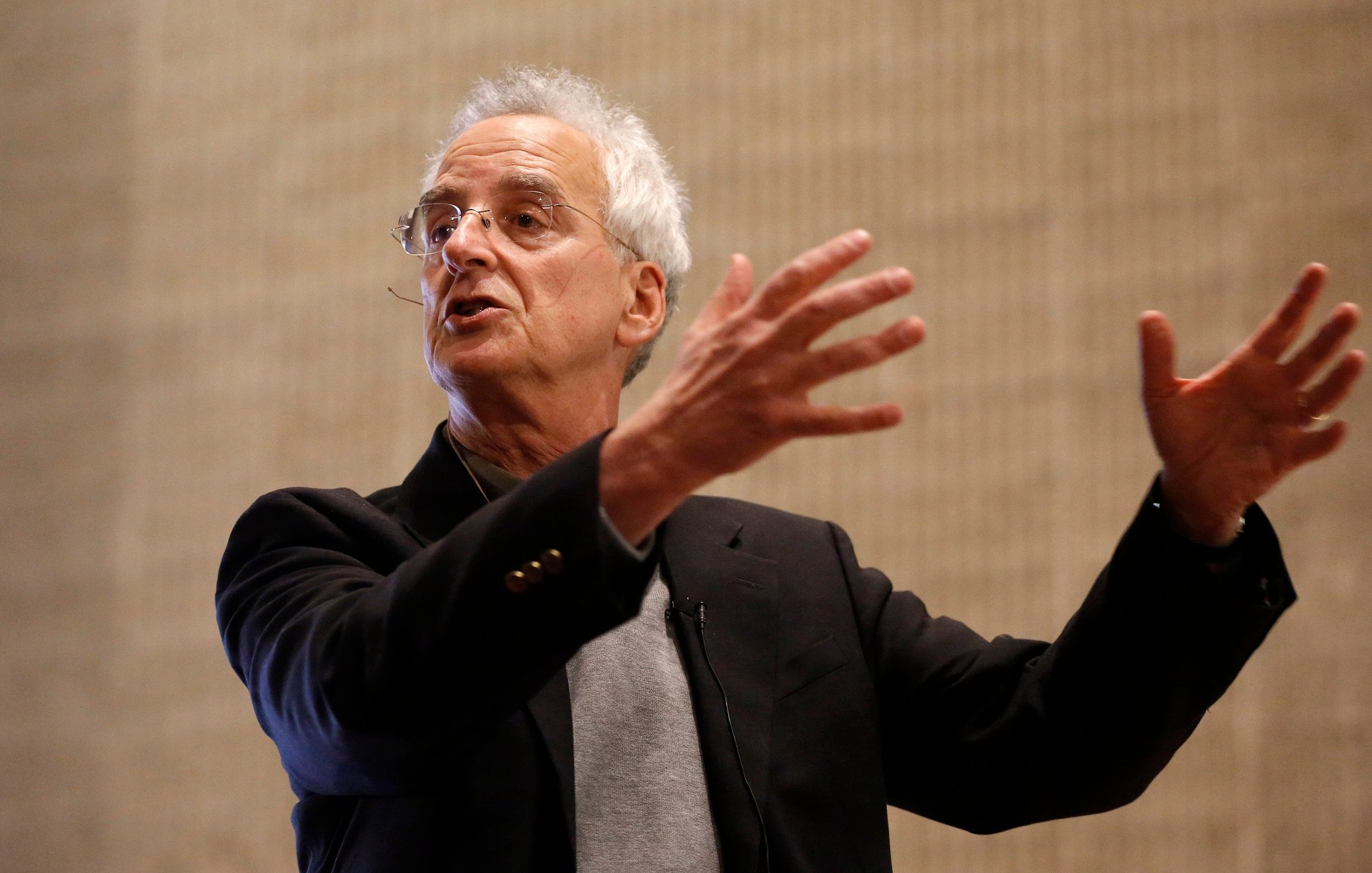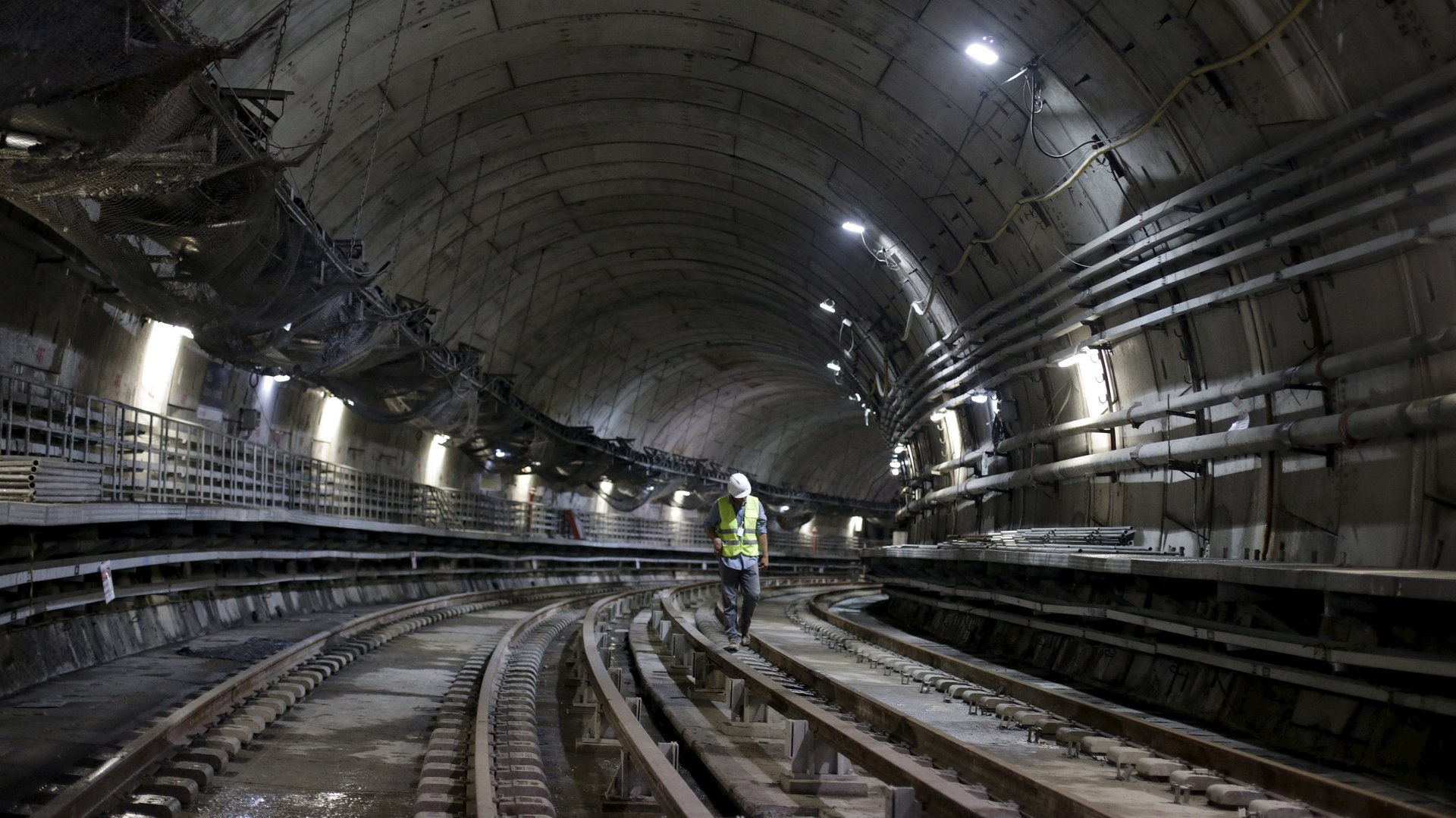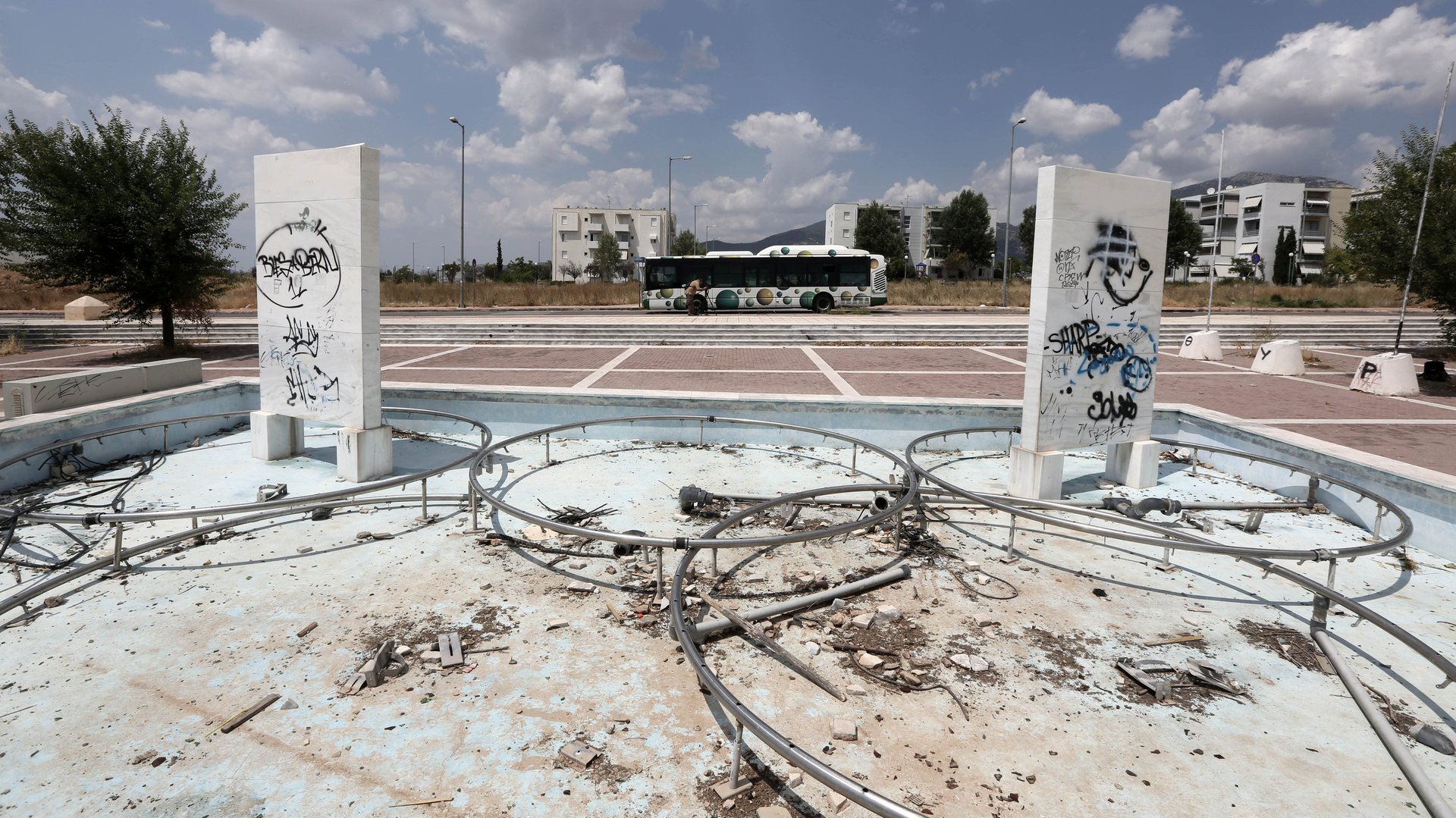The gringo economist Brazilians love to hate predicts the Olympics will be disastrous for Rio
Andrew Zimbalist isn’t popular with Rio de Janeiro’s civic boosters. He’s a sports economist at Smith College, a private university in Massachusetts, and an outspoken skeptic of the economic benefits of hosting the Olympics. In a recent interview with a Brazilian newspaper he said luring the Olympics to Rio was a foolhardy development strategy that had left Rio’s image “tainted and damaged.”


Andrew Zimbalist isn’t popular with Rio de Janeiro’s civic boosters. He’s a sports economist at Smith College, a private university in Massachusetts, and an outspoken skeptic of the economic benefits of hosting the Olympics. In a recent interview with a Brazilian newspaper he said luring the Olympics to Rio was a foolhardy development strategy that had left Rio’s image “tainted and damaged.”
In response, partisans of the games let him have it with both barrels. One Rio newspaper columnist suggested he was doing the bidding of Brazil’s anti-capitalist left. Rio mayor Eduardo Paes singled him out at a press conference: “What we would hope for from a specialist is that he specializes and knows the numbers.”
Zimbalist doesn’t back down an inch. ”Well I’m sure that I don’t like Paes any more than he likes me, so it’s mutual,” he says.

Zimbalist laid out the economic case against hosting mega-sports events in his 2015 book Circus Maximus. He says that bids for the Olympics and the World Cup (which Brazil hosted in 2014) are typically driven by what he considers an unholy alliance of local construction, tourism, media, and financial interests, along with pliable politicians. The boosters tout the event as a goldmine by ginning up economic impact studies that assign unrealistically optimistic multiplier effects to spending at the games.
The events do boost the bottom lines of businesses that build arenas or host visitors, Zimbalist writes. But for private citizens, the sudden surge in construction skews property values, and some homes are razed for sports venues. There’s extra traffic and pollution, money is diverted away from vital social services, and cities are saddled with white-elephant stadiums and big debts. Over the past 50 years, the scenario has played out, with variations, in one Olympic venue after another, from Montreal, to Athens, to Sochi, Russia. The success stories, such as Barcelona and Los Angeles, tend to be outliers, he says.
“The problem is the construction industry invariably is the largest employer in a city’s economy, so the executives of large construction companies have a lot of political influence and that’s usually who politicians listen to,” says Zimbalist, who played a high-profile role in persuading Bostonians to oppose the city’s 2024 Olympic bid. (It withdrew last year.)
Zimbalist spoke to Quartz by phone on July 31. The interview has been lightly edited for clarity.
Quartz: The idea was that hosting the World Cup in 2014 and the Olympics this year would enhance Brazil’s status as an emerging power and help tourism and other businesses. External pressure would also serve as a catalyst forcing Brazil to address longstanding infrastructure and environmental issues. So what’s wrong with using the Olympics to help bootstrap development?
Zimbalist: I think there are many, many things that have gone wrong but the first thing that went wrong is the whole concept is misplaced. The idea that you can have a developing city in a developing country host the Summer Olympic games to me is economic irresponsibility. You’ve got 35 plus venues. You’ve got an Olympic Village. You’ve got a media and broadcasting center. You’ve got an enormous amount of transportation and communications infrastructure and hospitality infrastructure that you have to build. You have organizational and operational requirements to be able to pull off the games. And you’re starting in a city that basically has very few of those needed resources and has meager financial resources, at best, to be able to finance it all.
But the Rio government says more than half of the financing is coming from the private sector?
Even when you acknowledge that some of the direct financing is private, maybe roughly 50%, even then the private sector is getting enormous subsidies from the government. It’s not really private, because the government is giving them land. The government is giving them tax subsidies. The government is giving them low-interest loans, all of which cost public money. The idea that Rio has those kind of resources to lavish on a party for 17 days is absurd.

Are there benefits from the public infrastructure that was built for the World Cup and the Olympics? (Editor’s note: In 2011, Rio inaugurated a cable car connecting a big cluster of favelas, or shantytowns, known as Complexo do Alemão. For the Olympics, the city just initiated a subway line from the upper class Ipanema neighborhood to the comfortable Barra da Tijuca suburb, site of the Olympic Village.)
It certainly combines many of the negative features of previous games. And frankly I get no pleasure out of seeing this because there’s untold suffering and tragedy here. You’ve got 77,000 favelados (shanty-town dwellers) who’ve been evicted from their homes and that’s the biggest tragedy of all.
The subway to Barra will have some benefit for some people. But these are not not priorities in the development process. They represent misallocations of resources, as far as I’m concerned. Insofar as they do that, they hurt economic development in Rio and Brazil.
What could go wrong with the management of the games themselves in the next two weeks?
The largest potential operational glitch is terrorism and the second to that is violence. Those are the biggest ones. Anything that happens on the transportation front is an inconvenience. If it means taking two hours to get from Olympic Village to Maracanã stadium, that’s not good. And the people who are doing it are going to suffer. But those kind of sufferings are minor relative to any serious violence or terrorist incident. I’m not predicting there will be. But those would be the most depressing and serious mishaps.

There are numbers all over the map on the cost of the Rio games. Oxford University put the price tag at $4.6 billion. The Rio government says 39 billion reais ($11.9 billion). You say roughly $20 billion. Why can’t people agree on a number?
Everybody’s got a different number and I don’t think they’re very meaningful, frankly. Oxford does not include infrastructure at all. Oxford is only looking at operations and permanent sports venues. It’s unquestionable, by the way, that the infrastructure is the largest component here.
Here’s the problem with any of the numbers. First of all you’ve got the problem that when Rio was awarded the games in 2009, the real was worth 50 cents. Today it’s worth somewhere around 28 cents. If you take the construction contracts that started to be implemented in 2009 and continued in 2010, 2011, and 2012 and convert them at 50 cents, you get a much higher dollar number than if you convert them at 28 cents. Unless someone can tell you how they’re doing the exchange [rate] calculation, there’s a lot of gamesmanship that goes on there.
The proper way to do it, is if you spent— this is hypothetical—1 billion reais on Maracanã in 2009, you should count that as $500 million because at the time that you did it the real was worth 50 cents to the dollar. If you take the 1 billion reais and say, ‘Oh today it’s only worth 28 cents,’ you come up with $280 million. That’s not the right way to do it. You should do it from the time the money was actually spent.
Problem No. 2, what do you count? Do you take the subway from Ipanema to Barra and say that all of that cost, which is now over $3 billion, has to do with the Olympics. Or do you say, ‘No, really most of that doesn’t have to do with the Olympics. It’s going to be around for a long time, and therefore we’re only going to count 50% of it or 40% of it, or some other percent of it, toward the Olympics.’
The third problem is you’re dealing with some expenses incurred by the private sector, some expenses incurred by the city government, some expenses incurred by the state government, and some expenses incurred by the federal government. And they all have different reporting mechanisms, different accounting systems. How do you reconcile all of that? Some of that reporting is not done honestly. Some of the reporting does not include kickbacks given to the construction companies. All of that further complicates how you add up the numbers.

Brazil was booming at the time it was awarded the games. But now it’s in the midst of its worst economic crisis since the Great Depression. How does that affect preparation for the games?
What the economic crisis does is it creates a fiscal crisis. And if the various public entities don’t have enough resources to meet their obligations, then they have to cut budgets. And if they cut budgets then they are going to be lowering the quality of the facilities that are built or the implementation of the plans.
There’s been lots of reports about corners getting cut and I’m also concerned about disgruntled workers who aren’t getting paid, or not getting paid for overtime, who aren’t really caring about the job they do. Or even other workers who may be sabotaging the job, which appears to be happening at the Olympic Village.
So how will Rio affect future Olympic bids?
The next games that are auctioned off are the 2024 Summer Olympics. It’s going to be decided in September of 2017 in Lima, Peru, and already we have two dropouts. One of them was Boston. Boston was chosen by the USOC to be the US representative. Boston dropped out because it didn’t have popular support. Then we had Hamburg drop out. They had a plebiscite, a referendum, and a majority of people voted to have Hamburg to pull its bid. And we also might have Rome drop out because the new mayor of Rome is against the Rome bid. That leaves Los Angeles, Paris and Budapest.
I think that future bidders are discouraged and that’s why the (International Olympic Committee) passed this Agenda 2020, which purports to make it less expensive and purports that the IOC will be less rigid in its demands and more concerned about the development of the city. That had some initial positive effect in reigniting some interest. But the publicity around Rio has been so terrible. I don’t have a crystal ball, but it’s clear the Olympics has a number of challenges in front of it.
Correction: This story was originally published under the wrong byline.